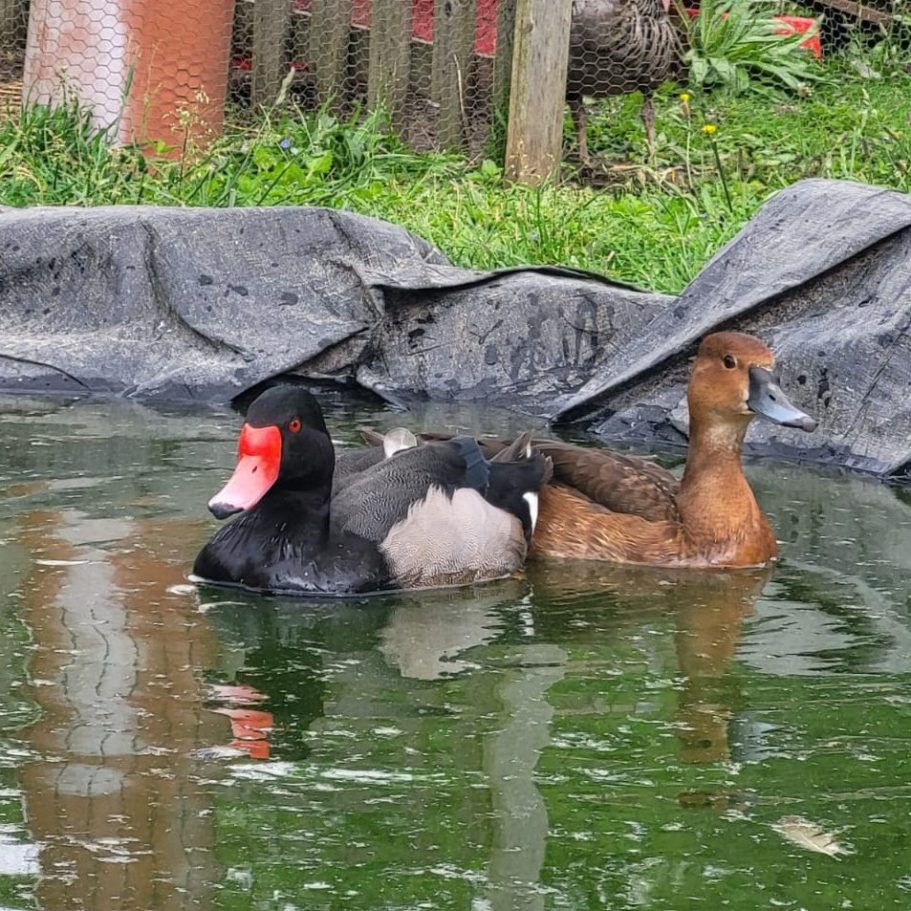
Dun Call Duck
The Dun Call Duck is an extremely rare colour variation of the Call Duck. The image to the left makes the bird look more blue however it is more of a caramel colour in person. Our trio are John Soper's line which we took over in 2023. We will have birds from this trio available later in the season.

Nēnē (Hawaiian) Geese
The Nēnē, or Hawaiian goose, is Hawaii's state bird and one of its most iconic wildlife species. Endemic to the Hawaiian Islands, this medium-sized goose is known for its distinctive buff-coloured cheeks and black head. The Nēnē inhabits a variety of habitats, from coastal dunes to volcanic slopes. Once nearly extinct in the mid-20th century, conservation efforts have helped its population rebound to around 3,000 individuals. Despite this success, the Nēnē remains vulnerable due to habitat loss, predation by introduced species, and human activities. Ongoing conservation measures are crucial to ensuring its continued survival.
We hope to have our first goslings from these in the 2025 season.
£270 per pair

Rosybill Pochard
The Rosybill Pochard is a striking waterfowl native to South America. Recognizable by its vibrant red bill, the male sports glossy black plumage with a greenish sheen, while the female is more subdued in brown tones. These ducks inhabit freshwater lakes, marshes, and slow-moving rivers. They primarily feed on aquatic plants, seeds, and small invertebrates. Known for their social nature, Rosybill Pochards often gather in large flocks outside the breeding season.
The Rosy-billed Pochard has been a favorite in collections for a long time because they are tame, friendly, and easy to breed. An additional advantage is that the drake does not have an eclipse meaning he keeps his colour all year round. The female typically lays a clutch of 10-12 eggs near the water but will also lay eggs in the nests of other ducks. The incubation period is 25-28 days. Usually reach maturity around 2 years old and make fantastic parents. Will use raised nest boxes as well as nesting on the ground. We currently have one pair of these stunning birds.
£110 per pair

Mandarin Duck
The Mandarin duck is a strikingly colourful bird native to East Asia, renowned for its vibrant plumage and intricate patterns. Males exhibit vivid hues of orange, green, purple, and white, with distinctive crests and sails, while females are more subdued in brown and gray. These ducks prefer wooded lakes, marshes, and ponds, feeding on seeds, plants, and small invertebrates. They are popular in aviculture worldwide due to their beauty, though their wild populations face habitat loss and hunting pressures. In captivity they come in various colour forms including Silver, Blonde and Red.
We currently house two pairs of these lovely little ducks. They tend to be nervous ducks and should be allowed a spacious enclosure with plenty of cover to hide.
From £95 per pair

Carolina Wood Duck
The Carolina wood duck is a striking North American waterfowl species known for its vibrant plumage and unique nesting habits. Males have iridescent green heads, red eyes, and intricate markings, while females are more muted with a delicate white eye ring. Wood ducks are popular in aviculture due to their manageable size, adaptability, and stunning appearance. They are relatively easy to care for, as they adapt well to aviary life with appropriate vegetation, a water source, and nest boxes. Breeding pairs are typically monogamous, and they require a simple diet of pellets and grains to thrive. In captivity they come in various colour forms including Silver and Blonde.
From £100 per pair

Pekin Bantam
Pekin bantams are one of the best chicken breeds as pets or show birds in our opinion. Their small size makes them easy and relatively cheap to keep. They will lay well from February until August/September and make fantastic mothers if you want to hatch from them. They are extremely friendly and are great for kids.
We currently house a mixed breeding group of these.
Hatching Eggs, Chicks, Growers and POL available most of the year.
All our pekins are kept in a barn over winter to ensure they stay healthy and dry. During the summer months, our pekins are put in ourdoor pens.
We need your consent to load the translations
We use a third-party service to translate the website content that may collect data about your activity. Please review the details in the privacy policy and accept the service to view the translations.

